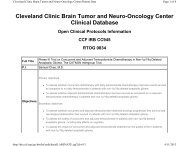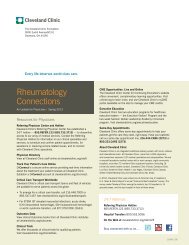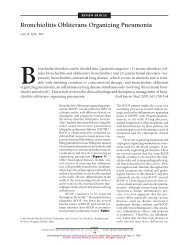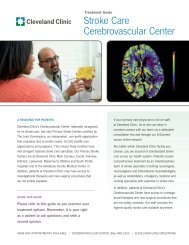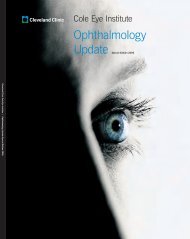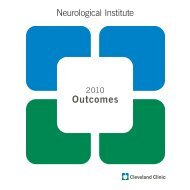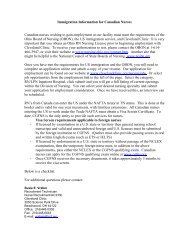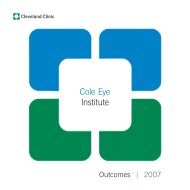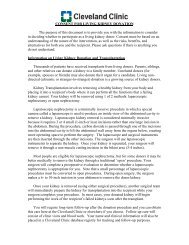Epilepsy Center - Cleveland Clinic
Epilepsy Center - Cleveland Clinic
Epilepsy Center - Cleveland Clinic
You also want an ePaper? Increase the reach of your titles
YUMPU automatically turns print PDFs into web optimized ePapers that Google loves.
At <strong>Cleveland</strong> <strong>Clinic</strong>, we have two <strong>Epilepsy</strong> Monitoring Units<br />
– one dedicated to adults and another in our Children’s<br />
Hospital reserved for our pediatric patients. These are unique<br />
areas designed for round-the-clock patient monitoring.<br />
In the Monitoring Units, our staff uses both EEG (electroencephalography)<br />
equipment to monitor brain activity and<br />
video cameras to record body movements during a seizure.<br />
This approach gives us a much greater understanding of seizures<br />
than would using either technique alone. The monitoring<br />
allows us not only to diagnose a seizure problem accurately,<br />
but also to design the best possible treatment plan.<br />
Patients are monitored in the unit throughout the day and<br />
night. The length of time people spend in the unit varies<br />
but usually ranges from three to seven days. Although this<br />
leaves little private time, it is the most effective way to study<br />
seizures and record information that will help us treat<br />
our patients.<br />
The admission process begins when your doctor decides that<br />
prolonged video-EEG monitoring would be useful in evaluating<br />
your seizures or epilepsy. Your name then will be placed<br />
on a waiting list for admission to the unit. As we anticipate<br />
discharges, we notify potential patients that space will be<br />
available. We try to give patients as much advance notice<br />
as possible.<br />
<strong>Epilepsy</strong> Monitoring Unit Staff<br />
You will be cared for by a number of different staff during<br />
your stay in the Monitoring Unit. Feel free to ask questions<br />
of any of us.<br />
Epileptologists: Neurologists specializing in epilepsy, known<br />
as epileptologists, are in charge of your medical care. They<br />
will order your medications and interpret the results of your<br />
video-EEG recordings. These staff physicians rotate coverage<br />
of the <strong>Epilepsy</strong> Monitoring Units for one- or two-week periods,<br />
so the doctors you see may change during your admission.<br />
Regardless, the doctor on duty always is in close contact<br />
with the physician in charge of your overall care. Physicians<br />
undergoing advanced training in neurology or epilepsy, known<br />
as residents or fellows, along with physician assistants and<br />
nurses, also will be part of the monitoring team.<br />
Registered nurses: Our nurses have primary responsibility for<br />
the daily care of patients and for managing the units. They can<br />
answer questions not only about what to expect during your<br />
stay in the unit, but also about epilepsy in general.



